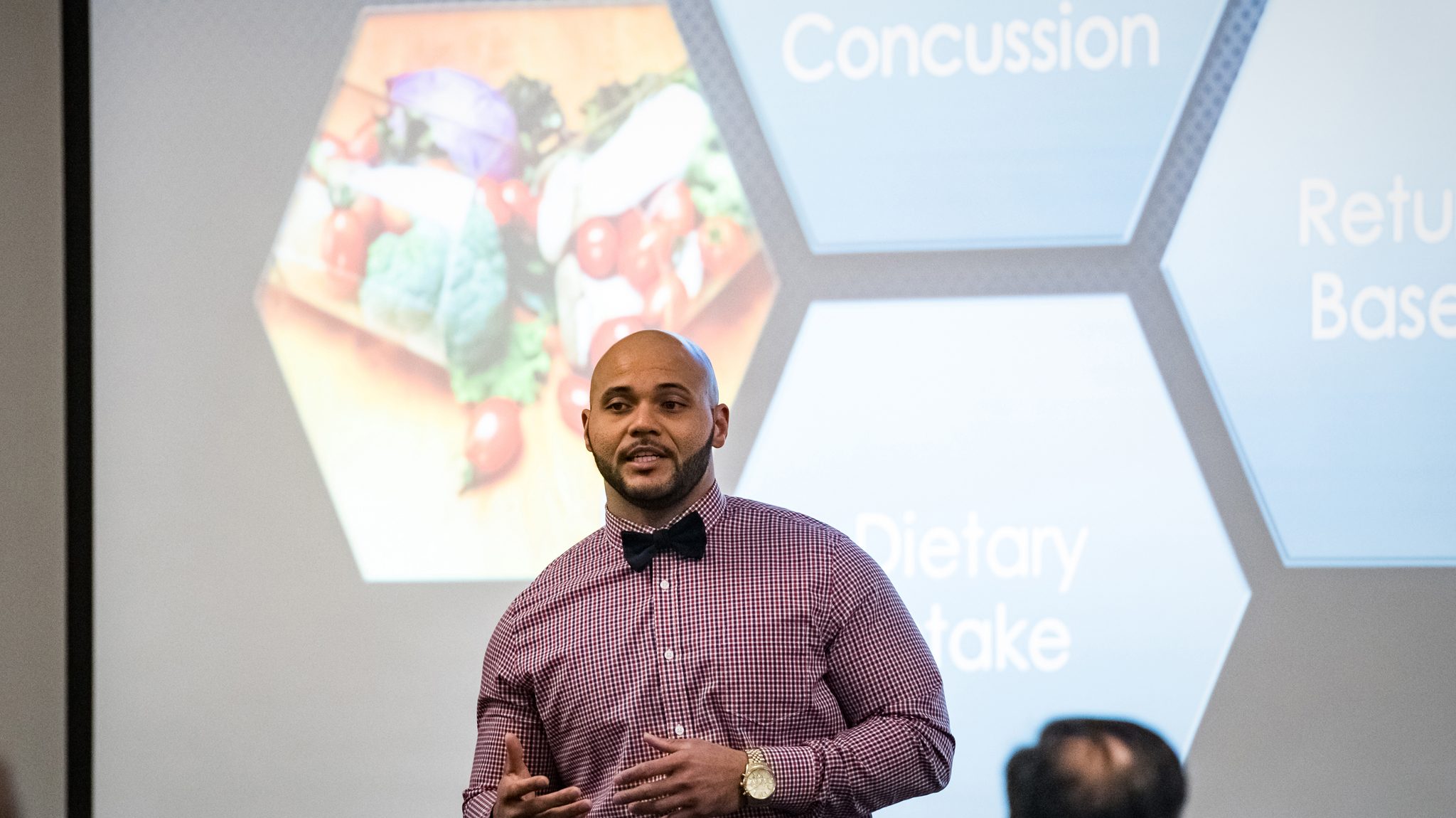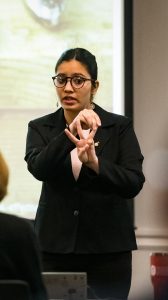
Matthew Frakes delivers his winning presentation on nutrition intervention in concussion treatment at the Three Minute Thesis Competition, sponsored by the UM Graduate School. Photo by Megan Wolfe/Ole Miss Digital Imaging Services
OXFORD, Miss. – Matthew Frakes, of Columbus, Ohio, and Prabhdeep Sandha, of Jalandhar City, Punjab, India, won first and second place in the doctoral category in the recent Three Minute Thesis Competition sponsored by the University of Mississippi Graduate School.
This annual competition asks graduate students to present a compelling oration on their research thesis topic and its significance in just three minutes. They are allowed to use one PowerPoint slide.
“My 3MT topic was looking at a nutrition intervention at the time of concussion diagnosis or suspicion of a sports-related concussion throughout the athlete’s concussion protocol until the athlete returns to baseline measurements,” said Frakes, a doctoral student studying sports nutrition in the Department of Nutrition and Hospitality Management.
Frakes said the nutrition intervention helps support overall energy and nutrient intake that is potentially diverged due to athlete’s loss of appetite or nausea symptoms experienced in concussions.
“I am also observing athlete symptomology and assessing total calorie intake and overall dietary intake, where these observations and recordings may be related to the return to baseline measurements from pre- and post-concussion assessments,” he said. “The goal of my study is to contribute to the findings on sports-related concussion recovery, and the impact overall energy intake has on return to baseline recovery time.”
Melinda Valliant, professor of nutrition and hospitality management, oversees Frakes in his doctoral research.
“Matthew has done an excellent job learning from and managing all facets of his pilot research project,” Valliant said. “His success in the 3MT competition is a testament to his willingness to take feedback and apply it.
“Matt has demonstrated that he is not afraid to step out of his comfort zone and take risks, and I am so happy that has received this well-deserved honor.”

Prabhdeep Sandha took second place in the doctoral category in the UM Three Minute Thesis Competition. Photo by Megan Wolfe/Ole Miss Digital Imaging Services
Sandha’s thesis also examined nutrition, but her research interest is in food security.
“One in eight Americans, or 40 million Americans, experience some form of food insecurity in a 12-month period,” said Sandha, also a doctoral student in nutrition and hospitality management.
“My research examined the impact of produce intervention on produce intake and behaviors of parents/caretakers of elementary school students in an economically distressed, highly food insecure, rural Appalachian Mississippi region.”
Three schools participated in the study; two were control schools and one was the intervention school. A six-week intervention was implemented with three important parts: cafeteria tasting station twice a week, nutrition education, and provision of take-home materials and gadgets.
Every Friday, participants at the intervention school also received $15 worth of fresh produce to replicate tasting station recipes at home.
“We utilized a validated 10-item USDA Household Adult Food Security Survey Module, which had questions like, ‘We worried whether our food would run out before we got money to buy more’ or ‘We couldn’t afford to eat balanced meals,'” Sandha said.
Sandha and her research partners found the perceived willingness to try new fruits and vegetables was significantly higher in the intervention group parents, compared to the control group.
“With this project, we were able to transform the household food environment to make it more likely that the family members have an adequate amount and access to healthy foods,” Sandha said. “This program also enhanced the university’s Flagship Constellation mission, which is to transform life through community outreach and community well-being.”
David H. Holben, professor of nutrition and hospitality management, oversees Sandha’s research.
“Ms. Sandha is very deserving of this award,” Holben said. “She is a servant-leader who excels in the classroom, in her assistantship at the Institute for Child Nutrition and in a research setting. This award recognizes her excellence.”
For more information about the Department of Nutrition and Hospitality Management, visit http://nhm.olemiss.edu/.